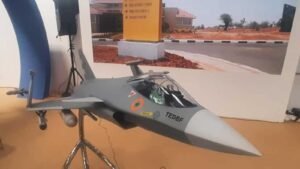Source : Mission Victory India

Rapid Rise and Emergence of India as a Global Power : Its impact on Geopolitics
by Girish Linganna
The world is currently facing multiple crises, including the Covid-19 pandemic and its aftershocks and the ongoing conflict in Ukraine, leading to high inflation, food insecurity and stagnant economic growth globally. As a result, many countries are struggling with debt burdens and financial instability. Discussions centring on supply chain decoupling, friend-shoring, relocation and de-risking have become increasingly prevalent.
Major global powers are also engaged in prolonged conflicts—ranging from hot, cold, proxy, hybrid and ‘gray zone’ wars—while nuclear weapons programmes are becoming more prevalent. Most nations are also now spending more on security and arms than in the past two decades, while new geopolitical alignments emerge as the world order changes.
In this context, India’s rapid rise has become a topic of intense international debate. As the world’s most populous nation, India’s impressive economic growth rates have drawn divergent opinions about its future prospects. While some predict that India is on track to becoming a superpower, others foresee potential challenges and pitfalls looming on the horizon. To understand the objective reality, let us examine India’s growth trajectory from the ground up and assess its potential geopolitical impact.
Overall, the global landscape remains volatile and uncertain, with multiple challenges and risks threatening global stability. In this context, India’s rise has both positive and negative implications for the region and the world. A comprehensive analysis of India’s economic and geopolitical outlook is necessary to understand its potential impact in the years ahead.
According to various research papers and reports, India’s economic growth trajectory has sparked divergent views and predictions. On one hand, Goldman Sachs and Arnab K Ray’s research paper, Logistic Forecasting of GDP Competitiveness, predict that India will become the world’s third-largest GDP between 2047 and 2050, which is considered a conservative projection.
On the other hand, Deutsche Bank’s Imagine 2030 paper suggests that India’s economy may reach $7tn by 2030, while the Japan Center of Economic Research forecasts that India’s GDP will surpass Japan’s by 2025. Morgan Stanley also predicts that India is well on track to becoming the world’s third-largest economy by 2027, and the New York Times supports this view.
However, amid these optimistic forecasts, the South China Morning Post has taken a different view, calling it a hype that conceals the real problems facing India. Despite these discordant views, it is clear that India’s growth story has captured the attention of the global community and its potential economic and geopolitical impact cannot be ignored. A nuanced assessment of India’s strengths and challenges is necessary to understand its position in the evolving global landscape.
The Indian economy has achieved a significant milestone by surpassing the economies of both France and the United Kingdom. Currently, there are only four larger economies in the world, namely the United States, China, Japan and Germany. Japan’s economy was decimated during World War II and was subsequently rebuilt with assistance from the US. Similarly, Germany benefited from the Marshall Plan and saw further growth following reunification, the collapse of the Soviet Union and the end of the Cold War. Both Japan and Germany have enjoyed a prolonged period of peace and stability since World War II, with their geopolitical alignment with the US playing a crucial role in their rise to economic power.
China’s economy, too, was largely supported by the US and the West, which facilitated its integration into the global economy. China’s last major conflict was with Vietnam in 1979 and, since then, it has enjoyed a peace dividend, which has contributed to its remarkable economic growth. A common theme among these economies is that they were aided by international support and enjoyed a period of peace ranging from 50-75 years.
In contrast, India did not benefit from such favourable international conditions. In fact, India faced several challenges that impeded its economic growth. Despite these challenges, India has managed to emerge as a significant economic power, a testament to the resilience and determination of its people. However, it is important to acknowledge the unique challenges that India has faced in achieving its current position and to recognize the contributions of its people in overcoming them.
India and China’s relationship will remain adversarial due to the unresolved border issue. India is the only country that can compete with China in terms of size and scale, but China undermines India’s strategic confidence through belligerence and hegemonic assertiveness. India is prepared to handle the Chinese threat on its own, but acknowledges the need for strategic partnerships with the US and other like-minded countries through Quadrilateral Security Dialogue (QUAD)— a strategic security dialogue between Australia, India, Japan and the US—to contain China’s increasing footprint in the Indo-Pacific region. India also maintains an insider status in countering China through the Shanghai Cooperation Organisation. India is the bulwark for the establishment and maintenance of a rules-based order.
India’s power lies in its ability to generate trust among other nations, as seen in its positive relationships with ASEAN, Africa and the Middle East. Its non-alignment heritage and successful UN operations also bolster this trust. As India rises, it will play a critical role in global issues, such as food security, climate change, supply chain stability and maintaining a rules-based international order due to its location, military, labour force, consumer market and stable politics.
Girish Linganna is a Defence & Aerospace analyst, and is the Director of ADD Engineering Components (India) Private Limited which is a Subsidiary of ADD Engineering GmbH, Germany with manufacturing units in Russia Rapid Rise and Emergence of India as a Global Power : Its impact on Geopolitics Rapid Rise and Emergence of India as a Global Power : Its impact on Geopolitics Rapid Rise and Emergence of India as a Global Power : Its impact on Geopolitics Rapid Rise and Emergence of India as a Global Power : Its impact on Geopolitics Rapid Rise and Emergence of India as a Global Power : Its impact on Geopolitics Rapid Rise and Emergence of India as a Global Power : Its impact on Geopolitics Rapid Rise and Emergence of India as a Global Power : Its impact on Geopolitics Rapid Rise and Emergence of India as a Global Power : Its impact on Geopolitics Rapid Rise and Emergence of India as a Global Power : Its impact on Geopolitics Rapid Rise and Emergence of India as a Global Power : Its impact on Geopolitics IgMp




